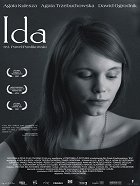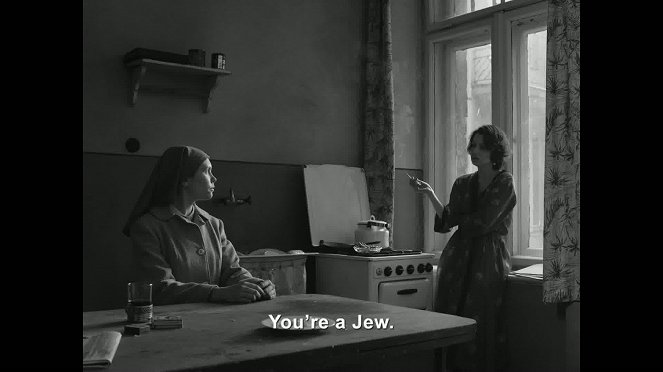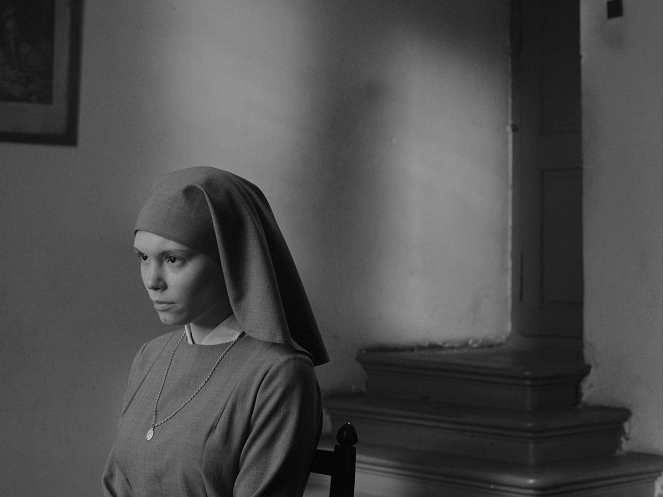Directed by:
Paweł PawlikowskiComposer:
Kristian Eidnes AndersenCast:
Agata Kulesza, Agata Trzebuchowska, Dawid Ogrodnik, Jerzy Trela, Adam Szyszkowski, Halina Skoczynska, Joanna Kulig, Mariusz Jakus, Izabela Dąbrowska (more)VOD (1)
Plots(1)
Poland 1962. Anna is a beautiful eighteen year old woman, preparing to become a nun at the convent where she has lived since orphaned as a child. She learns she has a living relative she must visit before taking her vows, her mother's sister Wanda. Together, the two women embark on a voyage of discovery of each other and their past. Her aunt, she learns is not only a former hardline Communist state prosecutor notorious for sentencing priests and others to death, but also a Jew. Anna learns that she too is Jewish - and that her real name is Ida. This revelation sets Anna, now Ida, on a journey to uncover her roots and confront the truth about her family. Ida has to choose between her birth identity and the religion that saved her from the massacres of the Nazi occupation of Poland. And Wanda must confront decisions she made during the War when she chose loyalty to the cause before family. (Curious Films)
(more)Videos (3)
Reviews (7)
Don't worry. A muted account of the traumas of history, an intimate detective story about identity and a film that deceives through its name, because the core of its power lies not in the beautiful but passive eyes of the nun, but in the electrifying character of Aunt Wanda (yes, this is a character no one here would want to play or write because she is a communist and is not portrayed as a lefty from hell). Pawlikowski looks at his characters through obsessively arranged frames, in which new-wave nostalgia, sacral chiaroscuroes and, in some places, the Kaurismäkie dance retro all meet. There is a bit of mannerism in it, and at the same time the film achieves a noticeable distance, which on the one hand is detrimental (it may be too withdrawn), on the other hand beneficial (the film does not fall into sentiment and defending / judging historical injustices and excessive psychologization). Ida is an extraordinarily clean and understandable (which is rare) shape that hides much of the drama beyond what is shown. It remains very strict and pleasantly reserved until the last moment. In a good way, a "noble" film that is always needed. [80%]
()
The case of Pawlikowski and Ida shows in practice the validity of the age-old maxim that talent without a theme is nothing, or rather that the most impressive works are created when the creators look into themselves and focus on personal themes. Before Ida, Pawlikowski was a solid, but in no way essential, filmmaker with a long career in essayistic documentaries for the BBC and in independent genre-festival circles. Ida reflects his own renaissance as a man and artist in connection with tragic events in his family life and the apparent balance of his own identity and existence as an emigrant whom his mother took from Poland to Great Britain when he was an adolescent. Pawlikowski conceived Ida as a reflection of Poland with its ethically problematic history and injustices perpetrated against others, which, unlike the film and its heroine, the country has never dealt with. Through the personal dimension, however, Ida does not fall into the historical thesis of guilt, but instead remains an intimate film about freedom, the crossroads that one comes to in life and the power of personal choice, regardless of how impermissible that choice may seem with respect to categories. At the same time, the chosen stylisation with the use of a classic format and black-and-white picture is an open tribute to cinema at the time in which the film is set, while concurrently using the existing expressive lexicons for its own ends (as is clear not only from the conceptually meaningful use of static and moving shots, but also from the claustrophobic framing, which gradually transforms into details at the close of the film). It remains a paradox that following global success and an Oscar victory, Poland appropriated as its calling card a film about accepting and coming to terms with the past, and thus discovering new strength for one’s own life, i.e. things that Poland’s society and government essentially refuse to do.
()
A black-and-white film with a 4:3 aspect ratio that is a tribute to the cinematography of the 1960s (during which the plot of the film takes place), and the return of director Pawlikowski to Polish films. The story of a young novice (the phase before becoming a nun) who goes on an intimate road trip to see her aunt to discover the grave of her parents (during which she finds out who she is), is not very attractive and is quite predictable. On the other hand, the artistic side of the film is worth it. Ida is a modest and pure film that emphasizes the psychology of the characters and the aesthetics of the image. It is interesting upon the first viewing, but there is no reason to see it again.
()
Most of the time, this doesn't happen, but with this film, I was more drawn to the visual aspect than the plot. Usually it's the story that gets me, but this black-and-white cinematography was so beautiful I just stared. Unfortunately, the story, while not bad, didn't captivate me as much, and the story of the nun just before taking her vows is somewhat predictable at times.
()
Big topic are "seeming randomly" addressed in an intimate and subtle way (these big topics overlap not only through character of Wanda with what we shall address in the Czech republic) with an unprecedentedly refined, coldly reserved visual side. And this visual side is surprisingly the biggest stumbling block, because each shot is so magnificently composed that the image steals the show. And it's never good. In other words, surprisingly, despite the rich and high-quality content, "the form overshadows the content" to a larger extent.
()



Ads